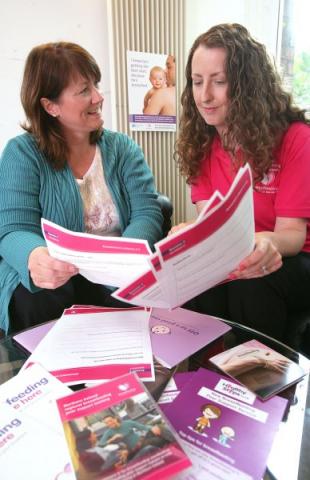Breastfeeding makes a difference

A team of mums across Northern Ireland who have previously breastfed their own babies are now helping other mothers to do the same. These volunteer ‘peer supporters’ receive training, and can then help and support mums in their own communities.
Janet Calvert, Health and Wellbeing Improvement Manager at the Public Health Agency (PHA), explained: “Breastfeeding has many important health benefits. Babies who are breastfed are less likely to suffer from ear and kidney infections or be admitted to hospital with gastric or chest infections. Children who have been breastfed are also less likely to become obese or to develop childhood diabetes. But the benefits don’t stop there, as mothers who breastfeed are also at less risk of developing serious illnesses such as breast cancer, ovarian cancer and osteoporosis.
“Breastfeeding is also free – you don’t have to buy formula, bottles, teats or sterilising equipment, and breast milk is always available, with the right ingredients, at the right temperature, so it’s easier to feed at night or on the go.”
In Northern Ireland, we have seen an encouraging increase in the percentage of mothers who breastfeed, with breastfeeding rates at discharge from hospital increasing from 40% in 2004 to 45% in 2010. However, the figures indicate that we need to target breastfeeding support to improve our low breastfeeding rates among young mothers and women on low incomes, as figures suggest that twice as many mothers over the age of 20 will breastfeed compared with those under age 20.
Janet continued: “For mothers who haven’t breastfed before, it may seem daunting, so the PHA is working with partners to roll out a programme of peer support. This means that someone who has herself successfully breastfed, and has undergone training on breastfeeding, is available from the local community to support breastfeeding mothers.
“Mother-to-mother peer support programmes are in place in many areas and are working with expectant and new mothers to help them breastfeed for longer. There are also 70 breastfeeding support groups which provide ongoing support for breastfeeding mothers throughout Northern Ireland.”
Sharing experiences
Rachel Hogan, 39, from Newry is mum to Rebecca (21) and James (two), and joined the PHA’s Peer Support Programme just over a year ago to help mums like her breastfeed for longer.
Rachel said: “Looking back at my first experience as a mum, breastfeeding certainly wasn’t promoted as much as it is today and there wasn’t as much support for mums who wished to breastfeed.
“Nowadays more people breastfeed, so when I was expecting my second child, I decided that I was going to try it. However it wasn’t always easy - None of my family had breastfed their children, which meant I didn’t have a great support network to turn to when I was finding it difficult, and I didn’t have much confidence in breastfeeding in public as it wasn’t something I was familiar with.”
Breastfeeding can be difficult at the start and mothers need the right support, encouragement and reassurance from their family and friends while they learn.
Rachel continued: “Over time my confidence grew and breastfeeding became much easier. My health visitor suggested that I look into the breastfeeding peer support programme as a way of helping other mums overcome some of the difficulties which I experienced.”
To become a peer supporter, Rachel attended a six-week training session with other women. Seesions to train peer supporters are led by two midwives, and at these sessions mums share experiences of breastfeeding, learn about the biology of breastfeeding and the health benefits, and are trained on how to listen and offer advice to help breastfeeding mums.
“We all have our part to play in helping mothers give their children the best start and it can be very helpful to have the support and encouragement of someone who knows about breastfeeding and babies, and is trained to answer questions. For new mothers, this support can make a real difference.
“I would advise any mother who is struggling with breastfeeding to get in contact with a local peer support programme. We offer a friendly service that is peer-to-peer, can talk about shared experiences, and support breastfeeding mums and families to do so for longer,” Rachel concluded.
Breastfeeding welcome here
As part of ongoing work in supporting breastfeeding families, the PHA also runs the ‘Breastfeeding Welcome Here Scheme’, which is a regional initiative to encourage and improve social acceptability of breastfeeding, ensuring that the environment is as supportive of breast feeding as possible.
The programme was launched seven years ago and now has over 300 members throughout Northern Ireland.
Janet Calvert explained: “Once you've made the decision to breastfeed your baby, whether or not you feel able to breastfeed in public can make an enormous difference to your quality of life. It can be daunting enough to get out and about with a new baby, but the added pressure of finding a place where you can feel welcome to breastfeed can prevent some mums from breastfeeding for longer periods of time, the ‘Welcome Here Scheme’ works by identifying places that are breastfeeding friendly.”
In order to join the scheme, businesses must agree to four membership criteria. These are that breastfeeding is acceptable in all areas of the premises, mothers will not be asked to stop breastfeeding, staff are aware of the scheme and will be supportive of breastfeeding, and a sticker and certificate about membership of the scheme will be displayed.
A full list of breastfeeding-friendly locations and further information about the ‘Breastfeeding Welcome Here Scheme’ and the PHA’s Peer Support Programme can be found on the PHA’s breastfed babies website www.breastfedbabies.org.
